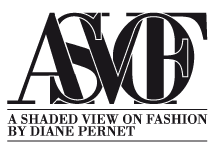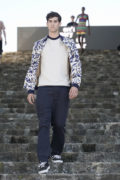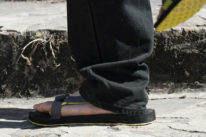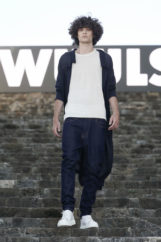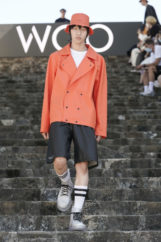Dear Shaded Viewers,
Giorgia Cantarini is a fashion journalist, stylist and projects curator that began working in the business at a very young age, as fashion has always been her true calling. Her experience spans from being a fashion writer as well as an appreciated stylist for digital and print publications such as Rolling Stone, Grazia, Glamour, Esquire, VOGUE ITALIA, i-d, La Repubblica, Hunger, Hypebae. Always keen on discovering emerging designers, responsible brands, styling and interviewing interesting figures all over the world. She currently acts as Senior Fashion Editor for L’Officiel Italia and L’Officiel Hommes Italia and she contributes for Mf Fashion and she is the Artistic Director and scouter of the responsible brands’ project “Sustainable Style” for Pitti Immagine.
DP: Where did you grow up? What was it like growing up in Venice?
GC: I grew up between Venice and Milan, being Venice the city I am most attached if I think about my childhood. I remember being surrounded by arts and beauty, I loved the Carnival, the ritual of renting or buy a costume, the quest for the perfect hand made mask. I also remember when the city was flooded and we would walk on tables put out in the streets so that people could step on them. Milan represented a big change for me, all my relatives where not there, I was a very shy kid and took me a lot to adjust to the new life.
Career history
DP: How and when did you become interested in sustainability?
GC: I think I had an epiphany when I first heard of the Ranaplaza disaster in 2013, how can you become immune to such a tragedy in the name of fashion? I never questioned my shopping habits before that, also because in the past as customers you didn’t really know how all the brands operate, eventhough people should think before buying fast fashion, how can you expect a good quality T-shirt to cost 10 euros? How much money do you think the worker got out of this? Probably 20 cents… and that is shocking. An average wage in Bangladesh is around 200 euros a month, which is actually getting worse after the pandemic. I’m not saying we need to shut down these companies, people living in these countries rely on these jobs to survive, I’m saying that the big corporations and fashion brands that commision work to these companies should be less greedy and more human-driven, sustainability is not only about the saving resources, or putting in place an organic or certified production, it is also about ethics.
DP: What actions have you taken both personally and professionally?
GC: I’m not buying anything, or I try to buy as less as possible. I go for vintage, I repair and re-customize my own clothes or I buy the textiles and I commision my pieces to a tailor I work closely with. It’s actually becoming a trend and more people got interested and asked me to customize clothes for them or to make some new. I buy only quality pieces from brands that work with very high standards of responsaibility. Professionally I started to work with Pitti Immagine in 2020, I brought them a selection of responsible brands from all over the world, focusing in communicating that these brands are as cool as ever and they represent the future, they envision that being responsible has to be from the start and being more and more sustainable is an ongoing process and mission for them to achieve.
Since the first edition, Sustainable Style has been a hub of talents such as Y / Project – present with the special Evergreen capsule and ANDAM Prize winner in 2020 – and Uniforme (ANDAM Prize winner in July 2021) as well as LVMH Prize finalists such as Phipps and Federico China. Furthermore, the language of Sustainable Style is irreverent, capable of communicating in a positive and non-coercive way, setting up a contemporary dialogue with the public thanks to the use of social media and technology, as happened for Wonderwall, the fashion movie made with a artificial intelligence technique never used before by the fashion world and as the protagonist an inclusive cast. The third episode of the project is dedicated to the inclusion and enhancement of the diversity of each creator. Each brand has a story to tell, an ambitious value path, ideas, projects to safeguard the territory and preserve craftsmanship. The names of the 15 brands protagonists at Salone M of the Fortezza da Basso are: Arbo (from France), Connor McKnight (from USA), DNI (from Peru), Federico Cina (from Italy), Monad London (from UK), Myar (from Italy, Ordinary Disorder (from Austria), Patchouli Studio, Reamerei Stories, Woo and Wuuls (all Italian companies) Uniforme (from France). In addition, for this edition there are two very important capsules: the first by Patrick McDowell which involved Katharine Hamnett, the champion of eco fashion since the 1980s, for a collection of T-shirt slogans called “Help” to clearly express the difficulties of the British fashion industry caused by Brexit; the second presented the special capsule “OVERLAND” Vitelli x Bonotto, made in the form of 3 tapestries and a capsule collection produced with the weaving tests of Bonotto, a leading company in fabrics and with an excellent sustainable production, and Doomboh fabric scraps (100% regenerated wire) “OVERLAND” is a Vitelli and Bonotto’s tribute to the theme of the journey “to the East” opened by hippies from the mid-1950s to the end of the 1970s. In addition, this year I thought of doing a take over of the Fortress with a special live performance, created with an unpublished choreography by performers from competitive disciplines such as parkour, poppin, krump and acrobatic bike, to reveal the collections of all the designers , to return to life, loving a fashion that is good for you and why not, having fun. We landed on every Italian daily newspaper and made it into Monocle, Wallpaper, Highsnobiety, WWD, The New York Times.
DP: How do you see the future?
GC: It’s a big question to ask but I don’t have an answer. We have a couple of years to trying and stop the climate change that we are experiencing right now. If we keep living, consuming, buying and eating like we are doing now we are gonna collapse very soon. Scientists say that it is not just humans who are at risk. A study which examined data for 350 kinds of mammals, birds, reptiles and fish, also found the numbers of many species have more than halved. Experts say that seas will become emptied of fish while forests – which absorb carbon dioxide emissions – are completely destroyed and freshwater supplies become scarce and polluted. The question is do we still want to live on this planet? Then we need to put our attention to the environmental issues and address them, find solutions but moreover we need to tell what is happening with transaparency, it’s up to the governements to do that and it’s up to us to actually teach the younger generation to be respectful in what they do, how they live and consume. It’s a matter of education. Have you watched Seaspiracy? No more fish in the seas by 2030 if we keep consuming this way.
DP: What do you think businesses have to do to get on track?
GC: They have to be transparent about what they do, to themselves and to the customers. They need to analyze how they operate in order to get better, it’s a strategic work: how do I get to use less water, less energy, where can I find the best certified textiles? Do I treat my workers, artisans, people, correctly? Do I pay them fairly? These are all the questions companies need to ask themselves in order to improve more and more.
DP: Who do you think is making the best progress in that direction?
GC: Hard to say, I think emerging brands are the best, they work with mindfulness, producing little batches, fiding solutions to be more and more responsible. As for big brands I think Patagonia and Veja are doing a great job, I am really impressed by Hermès working with a new vegan material that comes from mushrooms for a new bag, as well as Stella McCartney constantly trying to improve her production into a more sustainable one.
DP: How much of what we hear is greenwashing?
GC: It is not super easy to spot greenwashing, but if I can give you clues it’s about making big statements, the abuse of the word sustainable that is not associated to verified information about products, initiatives and actual work in progress of these so called “sustainable projects”.
DP: Future projects?
GC: I am working on a video series regarding women in sustainabilty, as I feel they need to be exhalted and well represented for what they do for their companies and indirectly for us customers. Personally, I want to try to cut off non-sustainable projects in my lifestyle: from soaps to beauty products, from pharmaceuticals to what is in my house in terms of furniture.
Later,
Diane
